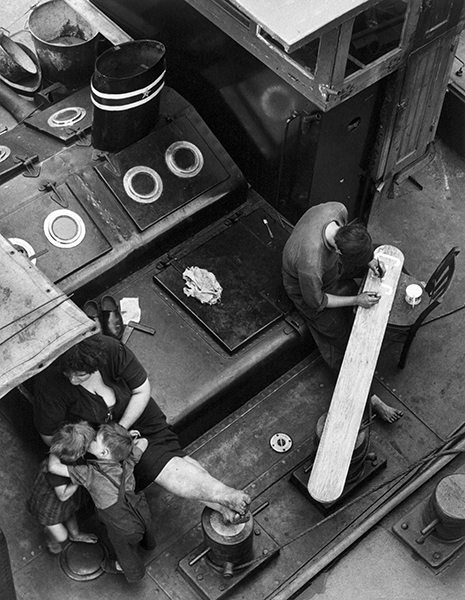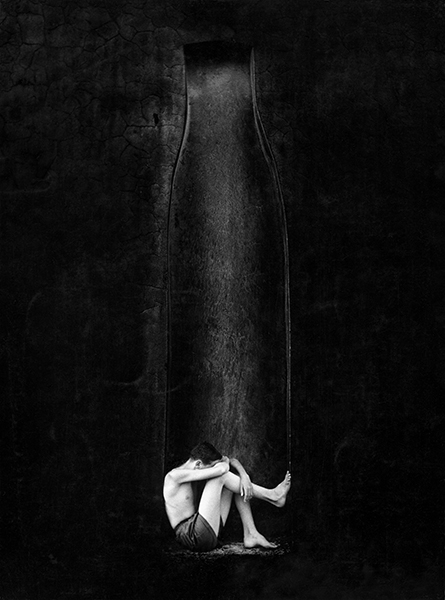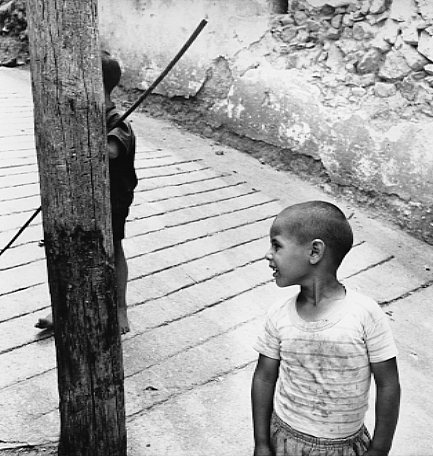PHOTOGRAPHY IN ITALY 1945-1975
Masterworks from the Collection of Paolo Morello
September 22nd - November 1st, 2012
 Gianni Berengo Gardin. Tuscany, 1965
Gianni Berengo Gardin. Tuscany, 1965
 Ferruccio Ferroni. The Cloud, 1950
Ferruccio Ferroni. The Cloud, 1950
 Ferruccio Ferroni. Seascape #1, 1950
Ferruccio Ferroni. Seascape #1, 1950
 Gianni Berengo Gardin. Family on the Seine river, 1953
Gianni Berengo Gardin. Family on the Seine river, 1953
 Gianni Berengo Gardin. Venice. San Marco, 1954 c.
Gianni Berengo Gardin. Venice. San Marco, 1954 c.
 Piergiorgio Branzi. Black wall, 1954
Piergiorgio Branzi. Black wall, 1954
 Piergiorgio Branzi. Scanno, 1955
Piergiorgio Branzi. Scanno, 1955
 Vittorio Piergiovanni. The Factory, 1957 c.
Vittorio Piergiovanni. The Factory, 1957 c.
 Federico Patellani. Belgian Congo, 1957
Federico Patellani. Belgian Congo, 1957
 Giuseppe Bruno. A Journey to Umbria, 1958 c.
Giuseppe Bruno. A Journey to Umbria, 1958 c.
 Giuseppe Bruno. A Journey to Carnia, 1958 c.
Giuseppe Bruno. A Journey to Carnia, 1958 c.
 Alfredo Camisa. The Sickle, 1956
Alfredo Camisa. The Sickle, 1956
 Piergiorgio Branzi. Mykonos, 1959
Piergiorgio Branzi. Mykonos, 1959
 Caio Mario Garrubba. Nanjing (China), 1959
Caio Mario Garrubba. Nanjing (China), 1959
 Gianni Berengo Gardin. Venice. The Bridge of Sighs, 1960 c.
Gianni Berengo Gardin. Venice. The Bridge of Sighs, 1960 c.
 Gianni Berengo Gardin. Venice. Gondola at St Tomà, 1959 c.
Gianni Berengo Gardin. Venice. Gondola at St Tomà, 1959 c.
 Giuseppe Bruno, Asolo, 1960 c.
Giuseppe Bruno, Asolo, 1960 c.
 Alfredo Camisa. Bagnara Calabra, 1960
Alfredo Camisa. Bagnara Calabra, 1960
 Tazio Secchiaroli. Federico Fellini directing Otto e mezzo, 1963
Tazio Secchiaroli. Federico Fellini directing Otto e mezzo, 1963
 Pepi Merisio. Siena Crete,1964
Pepi Merisio. Siena Crete,1964
 Franco Pinna. Orgosolo. Choir singers in a tavern, 1960
Franco Pinna. Orgosolo. Choir singers in a tavern, 1960
 Gianni Berengo Gardin. Firenze. Psychiatric hospital, 1968
Gianni Berengo Gardin. Firenze. Psychiatric hospital, 1968
 Gianni Berengo Gardin. Parma. Psychiatric hospital, 1968
Gianni Berengo Gardin. Parma. Psychiatric hospital, 1968
 Mario Lasalandra. Judgement #3, 1967
Mario Lasalandra. Judgement #3, 1967
 Mario Lasalandra. Story of a Drama #8, 1970
Mario Lasalandra. Story of a Drama #8, 1970
 Carla Cerati. Shape of Woman, 1972
Carla Cerati. Shape of Woman, 1972
 Carla Cerati. Shape of Woman, 1972
Carla Cerati. Shape of Woman, 1972
The photographs gathered together in this exhibition present a small selection of the works I have bought over the last fifteen years. Many of them are well-known masterworks, other ones are less well known, but all of them have been carefully selected. My personal collection is the result of a precise project: my activity as a collector is a fragment of a larger jigsaw-puzzle, and strictly linked to my activity as a photographic historian, teacher, publisher, and curator. Nothing in my collection is there by accident.
Why did I start studying and exhibiting works produced in the thirty years between 1948 and 1978? For three different reasons, at least. First, because in that period — till television took off — photography played a prominent social role, much more important than today. All news was illustrated with photographs, so photography had the opportunity to represent the transformations of society and lifestyle in a period characterized by the so-called ‘economic boom’. Second, it was at that time that many youngsters started thinking of photography as a job, not merely as a hobby. They had the great opportunity to make photography an intellectual activity — but sadly, they missed it. Third, between the Fifties and the Sixties a great variety of new cameras, equipment, and, most of all, high quality printing papers were put on the market. If you compare a vintage print of those year with a modern print from the same subject, you immediately notice how deeper and richer the tones were, grays and blacks, in that period.
I am pleased to present in this exhibition some of the photographs I have loved most, and I have considered them more as good companions than great works of art. The names of their authors are, in many cases, world-renowned: Gianni Berengo Gardin, Mario De Biasi, Tazio Secchiaroli, Mario Giacomelli, among others. It was quite difficult to choose how to represent each of them. Any sacrifice would be hard to justify. Making choices is always a difficult task — but no serious scholar can avoid that responsability.